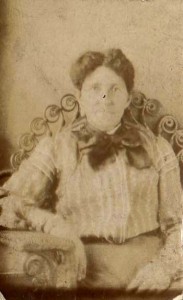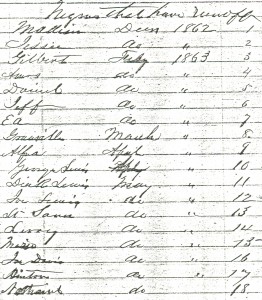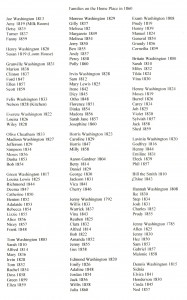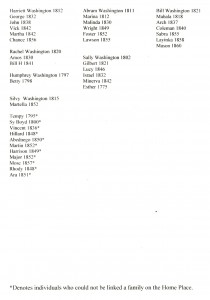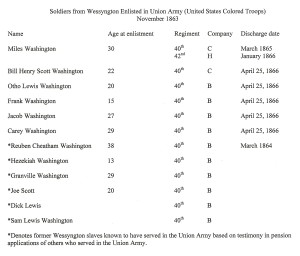On July 11th Nashville Public Television aired its documentary Wessyngton Plantation: A Family’s Road to Freedom. The film was inspired by my book The Washingtons of Wessyngton Plantation: Stories of My Family’s Journey to Freedom and the Tennessee State Museum exhibition Slaves and Slaveholders of Wessyngton Plantation. The documentary highlighted the life of my great-great-great-grandmother Jenny Blow Washington. Jenny along with her sister Sarah was brought from Sussex County, Virginia to Tennessee in 1802 by Joseph Washington who founded Wessyngton Plantation. Jenny married Godfrey a slave from a neighboring plantation and became the matriarch of one of the largest families on Wessyngton. Godfrey and Jenny later had nine children, including my great-great-grandfather Emanuel Washington (1824-1907). Today there are thousands of their descendants throughout the United States. Click link to view the documentary: http://www.youtube.com/watch?v=bdce9dud1c0
Posts Tagged ‘Emancipation’
WESSYNGTON PLANTATION: A FAMILY’S ROAD TO FREEDOM
Saturday, July 12th, 2014Wessyngton Plantation African American Cemetery 1796 to 1928
Thursday, November 29th, 2012
The African American Cemetery on Wessyngton Plantation was founded by Joseph Washington who came to Robertson County, Tennessee from Southampton County, Virginia in 1796. Joseph later returned to Virginia and brought African and African American slaves with him. The cemetery was used by the enslaved African American population of the plantation and their descendants from 1796 to 1928.
In 1995 a memorial monument at the African American Cemetery was erected by Mary Washington Holley, Thomas Blagden and Preston Frazer, direct descendants of Wessyngton’s founder Joseph Washington. It honors those buried there.
In 2012 a beautiful six-foot aluminum fence was erected to enclose and protect the cemetery. The fence adds charm and dignity to the cemetery. Special thanks go to Stanley Frazer Rose, a sixth generation descendant of Joseph Washington, for his generosity in funding this renovation.
The African American cemetery is located some distance from the Wessyngton mansion on a hill overlooking Caleb’s Creek. This is near where Joseph and his slaves first settled in 1796. The cemetery measures approximately 640 square feet and contains an estimated 200 graves. A geophysical survey using ground penetrating radar is planned to determine the actual number of graves in the cemetery. At that time, the original monument will be enlarged to honor all those who were buried in the cemetery. This monument will be funded in part by Mary Hotchkiss Gregg, Robina Gregg O’Rourke, Robert Etheridge Gregg, and Robert Hunnewell Gregg, sixth generation descendants of Joseph Washington.
Based on correspondence and plantation records from the Washington Family Papers collections, death certificates, oral history and eyewitnesses who attended burials at the cemetery, the following persons are known to be buried there:
Sampson Washington 1808 –1836
Caesar Washington 1826-before 1838
Elijah Washington 1823-before 1838
Matt Washington 1777-before 1838
Nicholas Washington 1822-before 1838
Noel Washington 1804-before 1838
Oscar Washington 1825-before1838
Peter Washington 1823-before 1838
Sam Washington 1770-before 1838
Sam Washington 1770-before 1838
Samuel Washington 1770-before 1838
Simon Washington 1783-1835-before 1838
Cherry Washington 1839-1839
Will Washington 1820-1841
Boyd Washington 1840-1846
Mariah Washington 1798-1846
Godfrey Washington 1787-1846-before 1850
Rosetta Washington 1827-1850
Camilla Lewis 1834-1852
Maria Washington 1853-1853
Wendy Washington 1853-1853
Westley Washington 1853-1853
Otho Lewis 1838-1854
Edward Washington 1834-before 1856
Al Washington ?-1838-before1856
Andrew Washington ?-1838-before 1856
Fowler Terry 1815-1838-before 1856
Simon Washington 1815-1838-before 1856
Toby Washington ?-1838-before 1856
Tony White 1820-1838-before 1856
Westley Washington 1822-1838-before 1856
Daniel Washington 1808-1841-before 1856
Wallis Washington 1822-1841-before 1856
Anthony Washington 1823-1843-before 1856
Archer Washington 1824-1843-before1856
Charles Washington 1809-1843-before 1856
George Lewis 1785-1843-before 1856
Jim Washington 1801-1844-before 1856
Aleck Washington 1795-1846-before 1856
Norfleet Washington 1846-before 1856
Tom Washington 1783-1846-before 1856
Gabriel Washington 1819-1850-before 1856
Dempry Washington 1837-1856
Ned Washington 1844-1856
Silvah Washington 1817-1823-before 1860
Charity Washington 1828-before 1860
Martha Ann Washington 1833-before 1860
Martha Washington 1835-before 1860
Sarah Washington 1840-before 1860
Arry Leavell Washington 1805-1841-before 1860
Sally Washington 1816-1829-before 1860
Mira Washington 1829-1842-before 1860
Sylvia Washington 1806-1842-before1860
Bena Washington 1770?-1844-before 1860
Tom Washington 1782-1846-before 1850
Easter Washington 1784-1850-before 1860
Henny Jackson Smith 1790-1850-before 1860
Jenny Washington 1760-1850-before1860
Unknown male 1785-1850-before 1860
Willie Washington 1820-1850-before 1860
Angelina Cheatham Washington 1814-1851-before 1860
Millie Washington 1851-before 1860
Allen Washington 1813-1856-before 1860
Mose Terry 1810-1856-before 1860
Westley Washington 1830-1856-before 1860
Hannah Washington 1780-1801-before 1860
Juda Washington 1775-1801-before 1860
Nanny Washington 1802-1804-before 1860
Rhoda Washington 1814-1819-before 1860
Fanny Washington 1815-1831-before 1860
Peggy Lewis 1795-1843-before 1860
Lettuce Washington 1857-before1860
Green Cheatham 1817-1860
Jack Washington 1849-1860
Marian Lewis ?-1843-1860
Temperance Washington 1795-1861
Amanda Washington 1837-1863
Aaron Gardner 1804-1860-before 1865
Esther Washington 1775-1860-before 1865
Jenny Washington 1785-1860-before 1865
Sarah Washington 1810-before 1865
Jack Washington 1859-1865
Moses Lewis 1857-1866
Vina Washington 1843-1869
America Washington 1815-1870-before 1880
Humphrey Washington 1797-1870-before 1880
Jenny Blow Washington 1792-1870-before 1880
Cornelia Washington 1859-1882
Axum Washington 1808-1880-before 1890
Britain Washington 1800-1880-before 1890
Hannah Washington 1808-1880-before 1890
Prudence Washington 1819-1893
Allen Washington 1825-1890-before 1895
Emanuel Washington 1824-1907
Jenny Washington 1830-1900-before 1910
Winnie Washington Long Biggers 1860-1900-before 1910
Henny Washington 1839-1913
Sarah Washington Cheatham 1810-1914
Hezekiah Tom Washington 1850-1918
Henry Drake 1868-1928
Digitalization of Southampton County Virginia Records Opens New Doors for African American Research
Sunday, April 17th, 2011The entire Court Order book collection of the Southampton County, Virginia Court from 1749 through the early 1880s has been digitalized. This includes 57,000 pages, involving approximately one million names. This information is free online at: www.wiki.familysearch.org/en/Southampton_County,_Virginia. This collection is a goldmine for African Americans tracing their ancestors who once lived in Southampton County. Many of the books that have been digitized were 300 to 700 pages. Court Order books from the 1700s to the end of the slave trade lists the names of Africans when they were first brought to the area, their ages, owner’s names, and in a few cases the ships on which they were brought over. Wills and estate settlements lists the names of slaves, descriptions and family relationships. If your ancestors came from Southampton County, Virginia, you must check out this collection. Thanks go to Southampton Circuit Court Clerk, Richard Francis, and the volunteers of the Brantley Association of America who undertook this huge project in 2009 and 2010.
Runaway Slave Escapes to Freedom in Canada
Wednesday, January 19th, 2011Elijah Smyth or Smith was originally owned by Joseph L. D. Smith on his plantation in Florence, Alabama. When Joseph Smith died in 1837, Elijah was inherited by Smith’s minor daughter Jane, who later married George Augustine Washington of Wessyngton Plantation.
Between 1850 and 1860, Elijah Smyth made his escape from slavery in Alabama most likely using the Underground Railroad. He made it to freedom in Buxton, Canada. Buxton, was established in 1849 by the abolitionist Reverend William King, and was one of four settlements in Canada which offered refuge for fugitive slaves. Buxton was located between Lake Erie and the Great Western railway, and consisted of approximately 9,000 acres of land. The logging industry provided an income for most of its residents.
Reverend King had strict guidelines for the settlers: land could not be leased, and could only be purchased by African Americans for $2.50 per acres. Once the land was purchased it had to be held for ten years. Houses had to be built that were at least 24 x 18 x 12 feet with a porch, and picket fence and flower garden in front. The town had four churches, three schools, a hotel and its own post office. In 1860, Buxton’s population was its largest with about 700 residents.
Elijah Smyth was literate. Since educating slaves was forbidden by law in Alabama, he probably was educated at the Buxton school.
Between 1850 and 1860, Elijah Smyth wrote a letter to Jane Smith’s aunt, Anne Pope. He sent the letter from Buxton, Canada.
Mrs. Pope,
Will you be so kind as I do not know who my young Mrs. is married to or where she lives. The least she will take for my papers of liberty as I am ready to pay a reasonable price. It is better for her to get a half loaf than no bread. If she will take a reasonable price write to me and then I will write to you and let you know what day to have a man in Detroit with my papers and will send the money by a friend to meet him. Be so kind as to write to me in haste.
No more but kindness,
Yours truly Elijah Smyth
[Washington Family Papers]
In the letter Elijah Smyth offered to purchase his freedom. It is unknown why he made the offer since he was already free. He might have wanted to purchase the freedom of other family members who were still enslaved. It also is not known whether Jane Smith responded to his letter or accepted his offer.
Divorce Case of Former Slaves Reveals Family History
Friday, October 23rd, 2009Today divorce is very common, but in 1800s and early 1900s it was rarely heard of, especially among African Americans. In my research I found this extraordinary divorce case of two former slaves in Robertson County, Tennessee which detailed the history of their family.
Alford Pitt 1830-1900 and his wife Arry Fort Pitt 1836-1918 were married during slavery and had eleven children. Alford was a carpenter and later accumulated more than 500 acres of land. He had African American and white sharecroppers working his land.
In 1900, Arry filed for divorce from Alford stating that he had an affair with two black women and one white one. She stated that she had worked hard to help him amass everything they owned and she was entitled to half. Alford claimed that she had not helped him accumulate his wealth and felt since they married during slavery and never married after they were emancipated that she was not legally his wife and therefore not entitled to any of his property.
The divorce case put a great strain on the Pitt family, their friends and neighbors. Arry had more than fifty witnesses to prove her claims and Alford had nearly as many to support his. Half the children sided with their mother and the others their father.
Arry was represented in court by a family member of her former owners. In 1866, a law was passed in Tennessee which made all former slave marriages legal if the couple continued to live as man and wife.
The courts ordered Alford to give Arry 100 acres of land, $1,000, a horse and buggy and other livestock. Shortly after the verdict Alford died from complications of a cold that he caught from walking to court in bad weather.
Some of the Pitt property is still owned by their direct descendants. A street that runs through the property bears the family name.
Runaway Slaves During the Civil War
Wednesday, October 14th, 2009
President Lincoln’s Emancipation Proclamation, issued September 22, 1862, declared freedom to slaves in the confederate states that did not return to the control of the Union by January 1, 1863. It did not free slaves from the border states Kentucky, Maryland, Missouri, and Tennessee. Many slaves from these states, however, were already free by this time due to self-emancipation─running away or being abandoned by their owners.
George A. Washington realized that his slaves would soon be tempted to leave his plantation Wessyngton. At the same time the Union Army was recruiting black soldiers, George made an offer to hire some of his slaves for a rate of $10 per month. From February through May 1863, twenty-four men agreed to stay on the plantation and work for the offered $10 per month. Of those twenty-four, however; eighteen left within a few months. The men had worked on the plantation all their lives and no doubt wanted to see what the outside world had to offer and to taste freedom. The men must have seen the offered salary as an attempt to keep them on the plantation. The above document lists the eighteen individuals who ran away from Wessyngton Plantation from 1862-1863.
Enslaved African American Families on Wessyngton Plantation in 1860
Sunday, July 12th, 2009
In 1860 Wessyngton Plantation was the largest tobacco plantation in the United States. The Washington family also held the largest number of enslaved African Americans (274) in the state of Tennessee. 187 of them were held on what was called the “Home Place” near the Wessyngton mansion. Eighty-seven others were held on a part of the plantation known was the “Dortch Place.”
Television Interview with John Seigenthaler Sr.
Monday, May 18th, 2009My half-hour television interview with John Seigenthaler Sr, A Word on Words, is available as a free downloadable Podcast.
http://www.wnpt.org/productions/wow/
Mr. Seigenthaler asked me many in-depth thought-provoking questions. At the end, he said, “I learned more from your book than I learned from reading my friend Alex Haley’s book called Roots.” I hope you enjoy the interview. Leave a comment with your reaction.
How Can We Honor Our Ancestors on Memorial Day?
Monday, May 18th, 2009On Memorial Day, we need to take a moment to tell our children about their ancestors who fought for freedom and America. During the Civil War, our ancestors fled slavery and the plantations and joined the Union Army to fight for freedom. We must never forget the sacrifices of our ancestors that we might enjoy freedom today.
